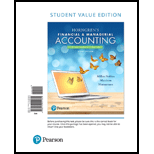
Concept explainers
(1)
Adjusting entries are those entries which are made at the end of the accounting period, to record the revenues in the period of which they have been earned and to record the expenses in the period of which have been incurred, as well as to update all the balances of assets and liabilities accounts on the
Accounting rules for
- To record increase balance of account: Debit assets, expenses, losses and credit liabilities, capital, revenue and gains.
- To record decrease balance of account: Credit assets, expenses, losses and debit liabilities, capital, revenue and gains.
Deferred expenses:
Advance payment for future expenses is called as prepaid expenses. These prepaid expenses are considered as assets until they are expensed or used. For the portion of used assets, expenses would be recognized by way of passing an adjusting entry. Prepaid expenses are also known as deferred expenses, because at the time of making payment, expenses are not recognized but deferred until they are used up.
Deferred revenues:
Collection of cash in advance to render service, or to deliver goods in future is known as unearned revenues. These unearned revenues are considered as liabilities until they are earned. For the portion of rendered services or delivered goods, revenues would be recognized by way of passing an adjusting entry. Unearned revenue is also known as deferred revenues, because at the receiving of payment in advance, revenues are not recognized but deferred until they are earned.
Accrued expenses:
Accrued expenses are the expenses that have been incurred but have not been paid yet. These accrued expenses create accrued liabilities. For the portion of payment made, accrued liabilities would be reduced by way of passing an adjusting entry.
Accrued revenues:
Accrued revenues are the revenues that have been earned, but the cash has not yet been collected for the earned revenue. These accrued revenues create assets. For the portion of collection of cash, created assets would be reduced by way of passing an adjusting entry.
To journalize: The transactions, assuming that R Way debits an asset account for prepaid expense and credits a liability account for unearned revenues.
(2)
To prepare: The related adjusting entries at December 31, 2018.
(3)
To post: The journal and adjusting entries to T-accounts (except cash account), and show their balances at December 31, 2018.
4
To repeat: The above three requirements, by debiting an expense account for prepaid expense and crediting a revenue account for unearned revenues.
5
To compare: The account balances in requirement 3 and 4.
Want to see the full answer?
Check out a sample textbook solution
Chapter 3 Solutions
Horngren's Financial & Managerial Accounting, The Managerial Chapters, Student Value Edition (6th Edition)

 AccountingAccountingISBN:9781337272094Author:WARREN, Carl S., Reeve, James M., Duchac, Jonathan E.Publisher:Cengage Learning,
AccountingAccountingISBN:9781337272094Author:WARREN, Carl S., Reeve, James M., Duchac, Jonathan E.Publisher:Cengage Learning, Accounting Information SystemsAccountingISBN:9781337619202Author:Hall, James A.Publisher:Cengage Learning,
Accounting Information SystemsAccountingISBN:9781337619202Author:Hall, James A.Publisher:Cengage Learning, Horngren's Cost Accounting: A Managerial Emphasis...AccountingISBN:9780134475585Author:Srikant M. Datar, Madhav V. RajanPublisher:PEARSON
Horngren's Cost Accounting: A Managerial Emphasis...AccountingISBN:9780134475585Author:Srikant M. Datar, Madhav V. RajanPublisher:PEARSON Intermediate AccountingAccountingISBN:9781259722660Author:J. David Spiceland, Mark W. Nelson, Wayne M ThomasPublisher:McGraw-Hill Education
Intermediate AccountingAccountingISBN:9781259722660Author:J. David Spiceland, Mark W. Nelson, Wayne M ThomasPublisher:McGraw-Hill Education Financial and Managerial AccountingAccountingISBN:9781259726705Author:John J Wild, Ken W. Shaw, Barbara Chiappetta Fundamental Accounting PrinciplesPublisher:McGraw-Hill Education
Financial and Managerial AccountingAccountingISBN:9781259726705Author:John J Wild, Ken W. Shaw, Barbara Chiappetta Fundamental Accounting PrinciplesPublisher:McGraw-Hill Education





